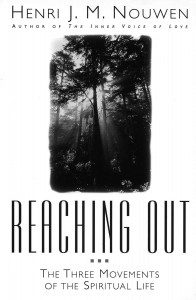Like Alice in Wonderland, it feels as if we have passed through the looking-glass. Or maybe we have slid into an alternate dimension of The Twilight Zone. Donald Trump has become president of the United States. And as the pundits say, elections matter. All manner of bad news has followed from Trump’s election: bad news for the climate, bad news for human rights, bad news for democratic and Constitutional norms, bad news for all who value honesty and integrity.
In these days of relentless bad news, it is healthy self-care to take an occasional media (or digital) fast. Put down your newspaper, smart phone, or laptop and get out into nature. Connect with friends and family. Or do whatever refreshes you and brings you joy. But I encourage you not to stop paying attention altogether.
Whenever current events feel overwhelming, I am often reminded of a passage from the spiritual teacher Henri Nouwen (1932-1996) which has particularly stuck with me over the year. Nouwen was a Catholic priest who was both a brilliant academic (who taught at Harvard Divinity School) and a dedicated activist who worked with people with mental and physical handicaps in the L’Arche community, “where people with and without intellectual disabilities live and work together as peers; create inclusive communities of faith and friendship; and transform society through relationships that cross social boundaries.”
 When I think about the many ways that current events can feel toxic to spiritual growth, I am reminded of Nouwen’s words:
When I think about the many ways that current events can feel toxic to spiritual growth, I am reminded of Nouwen’s words:
Not too long ago a priest told me that he canceled his subscription to The New York Times because he felt that the endless stories about war, crime, power games and political manipulation only disturbed his mind and heart, and prevented him from meditation and prayer. That is a sad story because it suggests that only by denying the world can you live in it, that only by surrounding yourself by an artificial, self-induced quietude can you live a spiritual life. A real spiritual life does exactly the opposite: it makes us so alert and aware of the world around us, that all that is and happens becomes part of our contemplation and meditation and invites us to a free and fearless response (50).
That’s a profound insight: the fruit of spiritual practice is not necessarily what happens on your knees or on your meditation cushion. Instead, the more important aspect of contemplative practice may be the way it changes how we are in world, such that every part of our daily life becomes “part of our contemplation and meditation and invites us to a free and fearless response.”
This insight from the contemplative tradition is powerful. At the same time, the activist tradition reminds us that it is equally important to remember that through working together we can also change the world to be less corrupt, so that there is less bad news. Along those lines, I plan a series of posts next week on “Resistance & Resilience.”
The Rev. Dr. Carl Gregg is a certified spiritual director, a D.Min. graduate of San Francisco Theological Seminary, and the minister of the Unitarian Universalist Congregation of Frederick, Maryland. Follow him on Facebook (facebook.com/carlgregg) and Twitter (@carlgregg).
Learn more about Unitarian Universalism: http://www.uua.org/beliefs/principles












